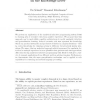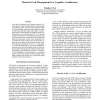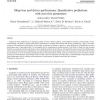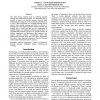115
click to vote
COGSR
2011
14 years 9 months ago
2011
We present an application of the analytical inductive programming system Igor to learning sets of recursive rules from positive experience. We propose that this approach can be us...
146
click to vote
COGSR
2011
14 years 9 months ago
2011
Goals play an important role in human cognition. Different aspects of human mind influence the generation of goals they pursue, and the goals guide their behaviors. In psychology...
136
click to vote
COGSR
2011
14 years 9 months ago
2011
We simulate the evolution of a domain vocabulary in small communities. Empirical data show that human communicators can evolve graphical languages quickly in a constrained task (P...
COGSR
2011
14 years 9 months ago
2011
We propose a model of routine sequence actions based on the Memory for Goals model. The model presents a novel process description for both perseveration and anticipation errors, ...
COGSR
2011
14 years 9 months ago
2011
Fatigue has been implicated in an alarming number of motor vehicle accidents, costing billions of dollars and thousands of lives. Unfortunately, the ability to predict performance...
112
click to vote
COGSR
2011
14 years 9 months ago
2011
Methods for cleaning up (or recognizing) states of a neural network are crucial for the functioning of many neural cognitive models. For example, Vector Symbolic Architectures pro...
152
click to vote
COGSR
2011
14 years 9 months ago
2011
Cognitive architectures need to resolve the diversity dilemma – i.e., to blend diversity and simplicity – in order to couple functionality and efficiency with integrability, e...
COGSR
2011
14 years 9 months ago
2011
Experiments on visual search have demonstrated the existence of a relatively large and reliable memory for which objects have been fixated; an indication of this memory is that re...
106
click to vote
COGSR
2011
14 years 9 months ago
2011
This paper brings together work in modeling episodic memory and reinforcement learning. We demonstrate that is possible to learn to use episodic memory retrievals while simultaneo...
116
click to vote
COGSR
2011
14 years 9 months ago
2011
In bandit problems, a decision-maker must choose between a set of alternatives, each of which has a fixed but unknown rate of reward, to maximize their total number of rewards ov...








